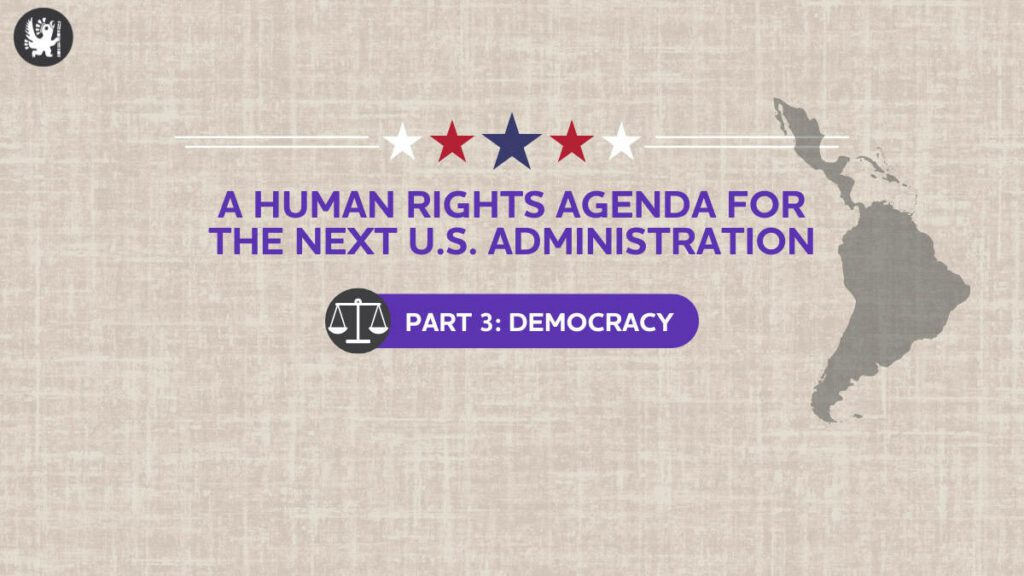This article is part of the series, A Human Rights Agenda for the Next U.S. Administration, outlining WOLA’s priorities for the upcoming U.S. administration, focusing on a human rights-centered approach in the Americas. As the United States prepares for a new administration, WOLA reaffirms its commitment to justice, dignity, and the fundamental rights of people across the region. In this series, we underscore the critical human rights issues that should guide policy discussions during this pivotal moment.
Across Latin America and beyond, a growing number of political leaders are consolidating power, attacking independent media, and eroding institutional checks and balances. Clear examples of authoritarian governments in the region include Nicaragua, Venezuela, and Cuba. While authoritarian tendencies are on the rise across the political spectrum, there are glimmers of hope, exemplified by Guatemala’s recent democratic transition and other efforts to uphold peaceful transfers of power and strengthen impartial and independent institutions. In countries like Mexico, Argentina and El Salvador, civil societies are actively trying to resist democratic backsliding.
In this complex landscape, WOLA works with civil society organizations and human rights defenders across the region, supporting their efforts to counter authoritarianism, protect civic space, fight corruption, and foster a vibrant, inclusive civil society. Strong civil societies, in turn, bolster civic participation, which is vital for influencing positive change. In the face of rising anti-democratic forces, the next U.S. administration should uphold the defense of democracy and human rights as core principles of its foreign policy.
We urge the next U.S. administration to prioritize the following actions:
1. Support Strong and Diverse Civil Societies to Bolster Democracies and Counter Authoritarianism
A thriving civil society is essential for a healthy democracy. By supporting organizations and activists in Latin America and beyond, the U.S. can help build resilience against authoritarianism. Strengthening diverse voices fosters a more inclusive political landscape and reinforces democratic values.
Allocate financial and technical resources to support human rights defenders and activists committed to preserving civic space and defending human rights in the region, ensuring that this support includes the participation of women and marginalized groups.
Support protection measures and mechanisms for human rights defenders facing threats and harassment, including policies to prevent and investigate violence and intimidation against them.
Extend assistance to civil society actors forced into exile, facilitating their contributions to democratic efforts in their countries of origin.
2. Strengthen Good Governance and Accountability
Upholding good governance is crucial for countering corruption and reinforcing the integrity of democratic institutions. The U.S. should lead both domestically and in foreign policy by promoting transparency and accountability, while supporting initiatives that hold corrupt actors accountable.
Promote good governance as a fundamental strategy to fight corruption and strengthen democratic institutions.
Uphold a consistent human rights approach by ensuring transparency in U.S. foreign policy, free from double standards based on economic and geopolitical interests.
Support initiatives aimed at achieving justice for human rights violations and acts of corruption in the region.
Redouble efforts to hold corrupt actors and perpetrators of human rights violations accountable, particularly those with assets in the U.S. This includes the robust use of the Global Magnitsky Act and other tools to target foreign officials and individuals involved in human rights abuses and corruption.
3. Protect and Promote Freedom of Expression
Freedom of expression is the bedrock of democracy, enabling open discourse and an informed citizenry. The U.S. should actively tackle disinformation and safeguard both traditional and digital rights to ensure diverse voices are heard without fear of reprisal.
Allocate resources to support and protect journalists and independent media in Latin America and elsewhere, especially where threats or reprisals are prevalent.
Promote responsible internet governance, including measures to hold major tech companies accountable for disseminating disinformation.
Safeguard digital rights and counter the spread of misinformation.
4. Promote and Support Democratic Institutions and Transitions
Strong democratic institutions are essential for maintaining checks and balances and upholding rights. The U.S. should be unwavering in its commitment to supporting democratic institutions and transitions, engaging with partners who share these values, and publicly and unequivocally condemning any actions that threaten democracy.
Support efforts to build sustainable democracies with independent institutions, and publicly denounce anti-democratic and anti-rights tendencies.
Promote free and fair elections as a cornerstone of democratic governance, while also supporting efforts to achieve peaceful and democratic transitions in countries like Nicaragua and Venezuela.
Enhance the capacity of multilateral organizations as mechanisms to safeguard democracy in the region. This includes contributing financial resources to support these bodies and committing to the promotion of their frameworks, such as the Inter-American Democratic Charter, to bolster and safeguard democracy,
By deepening its commitments in these areas, the next U.S. administration can play a pivotal role in advancing democracy and protecting human rights throughout the Americas.
Read part 1 (migration) and part 2 (drug policy) of this series
Source link : http://www.bing.com/news/apiclick.aspx?ref=FexRss&aid=&tid=671a5c397f1c429db72d2f647a513dde&url=https%3A%2F%2Fwww.wola.org%2Fanalysis%2Fpromoting-democracy-in-the-americas%2F&c=14779869384077625544&mkt=en-us
Author :
Publish date : 2024-10-24 03:10:00
Copyright for syndicated content belongs to the linked Source.
